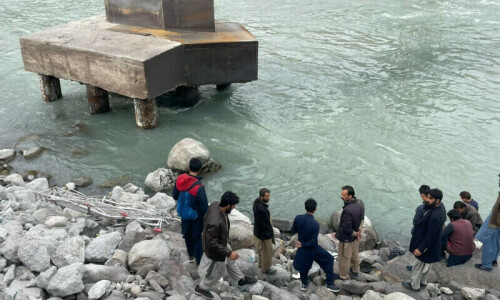KARACHI, Dec 17: There was no respite from load-shedding for citizens on Wednesday, as vast areas of the city remained without electricity for several hours due to strong fluctuations and power cuts. The Karachi Electric Supply Company (KESC) failed to increase generation, despite the option of using furnace oil if the SSGC reduced its gas supply.
Some outages were caused by fluctuations in KESC’s links with the Water and Power Development Authority (Wapda), which dropped supplies to the KESC in order to meet national demand. Observers believe the problem has more to do with the KESC’s failure to clear its dues with both Wapda and the Sui Southern Gas Company, however.
Three units of the Bin Qasim generation plant remained shut on Wednesday, while the remaining three (units one, five and six) together generated about 400 megawatts, around a third of the installed capacity of the generation plant, which runs mainly on natural gas.
The SSGC drastically cut gas supply to the Bin Qasim plant from 210 MMCFD to 55 MMCFD on Wednesday. Supply to other units was not cut. Surprisingly, KESC sources deny that anything of the sort occurred.
An SSGC spokesman, however, told Dawn that the company had an agreement with companies to whom it supplies the bulk of its gas that when gas supply from the fields is reduced in winter (due to any reason), supply to them will be reduced or terminated in order to ensure uninterrupted supply to domestic consumers, who do not have an alternative fuel.
Despite receiving about 700 megawatts from Wapda, the KESC’s failure to improve its generation capacity is compelling traders to relocate outside of Karachi. Traders’ associations are now planning “to lay siege” to KESC offices and facilities if they failed to improve generation and continued to issue inflated bills. They have asked their members not to pay their utility bills if their demands are not met within a few days.
About a third of the KESC’s feeders were overloaded on Wednesday due to a lack of maintenance and load distribution.
The utility has not been able to reduce load-shedding, despite the mild weather, prompting scepticism on the part of consumers regarding the recent commitment issued by the CEO of the company to improve generation capacity. The CEO promised that KESC will generate an additional 1,000 megawatts of electricity over the next three years through rehabilitation of the existing system, rental power solutions and completion of 222MW and 560MW projects. In his last press conference, he promised that 88MW would be added to the grid from the Korangi Power Plant from the first week of November. There is no indication that this has, in fact, occurred. Promises of reduced load shedding have also failed to be met.
Technical experts say the prevailing power crisis is a result of the previous government’s policies and the misuse of institutions. Analysts believe policy changes are required in order for institutions to be made accountable to the public. They added that the changing of the guard at KESC before the mandatory three year waiting period of not offloading shares on the part of Aljomaih indicated no policy change has been made.
It is also not clear to what extent the new owners of KESC have succeeded in extracting concessions, and what the fate of Aljomaih’s liabilities, built up over three years, will be. Analysts are also asking what the fate of KESC’s mortgaged assets is to be.
Further, they believe that generating units are being deliberately shut down for long periods to save on fuel costs, at the expense of the enormous production losses faced by industrial units. Line losses on the grid continue to be high, and load-shedding has increased to unprecedented levels. Analysts say a lack of transparency is evident at every level.












































Dear visitor, the comments section is undergoing an overhaul and will return soon.